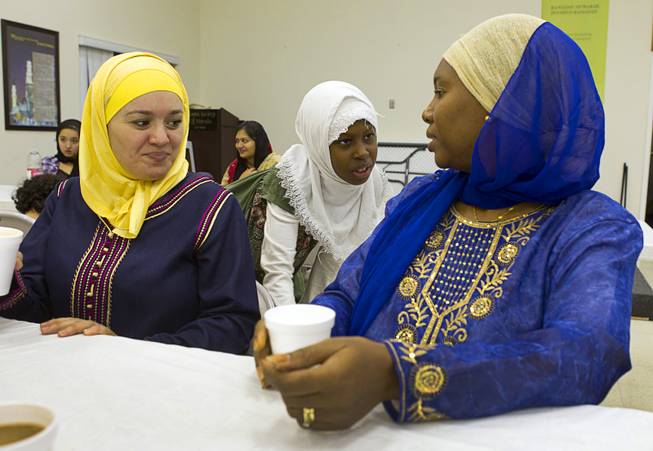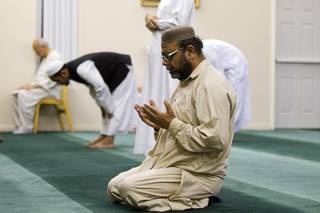
Mariam Diallo, 10, talks with her mother, Fatima, after dinner on the 27th day of Ramadan at the Jamia Masjid mosque Wednesday, Aug. 15, 2012. Jamila Laroussi is at left. During the month of Ramadan, Muslims fast from dawn until sunset.
Saturday, Aug. 18, 2012 | 2 a.m.
The sun is beginning to set behind the mosque of the Islamic Society of Nevada on East Desert Inn Road, its undulating domes and jutting minaret blending with the hodgepodge geometry of the Strip’s skyline in the distance.
Outside, a few boys play on their skateboards while the parking lot fills with Muslim worshippers arriving for Iftar, the daily fast-breaking meal eaten during the holy month of Ramadan, which began July 20 and ends today.
After a snack of dates, melon and water, followed by prayer, congregants line up — women on one side, men on the other — in the dining hall to fill their plates. It is after sunset, and this is their first meal since before daybreak.
The evening’s offerings include traditional Pakistani curries, Arab cheese pastries, an Indian dairy drink called sharbat and pizza; it’s a meal almost as diverse as the congregants themselves.
“Las Vegas has all the varieties of all the cultures and beliefs,” says Samira Rachih, a Moroccan immigrant who works as a library research assistant and Arabic tutor. “To be Muslim here is to be like part of a symphony.”
She introduces others at the table: to her right, a woman from Jamaica, to her left, an Afghani. Two women from Kenya and Pakistan wave from a few seats down. Some of them wear the hijab, or traditional Muslim head scarf, wrapped closely around their faces and necks; others let a strand or two of hair fall loosely beneath. Some sport bold hues and fine fabrics adorned with sequins; others opt for simpler looks in solid black or blue scarves.
Despite the fact that they’ve been fasting since sunrise, eating seems almost like an afterthought, the rice and tandoori chicken on their plates neglected in favor of excited chatter about their workdays or the upcoming Eid ul-Fitr festival, which marks the end of Ramadan.
“In our religion, like in many others, we are not supposed to gossip, we’re not supposed to lie, but during Ramadan that’s even more so,” says Jamila Laroussi, 38, who moved here from Morocco to study social work at UNLV. “It’s kind of human nature to do those things, and Ramadan is a time to give you pause. You get closer to God, you reflect on those less fortunate than you. It recharges you for the whole year.”
Rachih likens the spirit of the holy month, and last weekend’s culminating celebrations, Chaand Raat (“night of the moon”) and Eid ul-Fitr (“day of fast-breaking”), to Christmas for Christians.
“We look forward to it. Everyone comes together in the same way. Everybody shares,” she says, noting the month’s emphasis on charity work, which for this group includes preparing food for Las Vegas’ homeless. “Even if you have very, very little, what little you have you give to the community. You cook, you share, you love together.
At Saturday night’s Chaand Raat festival, held at the Italian American Club on East Sahara, the bustle and excitement in the air is not unlike that of Christmas Eve. About 400 members of the local Muslim community gather to share food, socialize and peruse booths from local vendors for last-minute gift purchases of scarves, jewelry and traditional pastries, to be given to family members at Sunday’s more intimate Eid ul-Fitr celebrations.
"We are celebrating what’s to come in the year ahead, not that the fast is over and we can go back to normal,” explains Rubina Sabir, who helped organize the event. “It’s a culmination of what you’re focusing on during Ramadan, which is the good things that a human should be. It’s like we’ve been training, and now we are celebrating our renewed spirits.”
For Khadeja Cochran, 54, who converted to Islam in March, that focus has been especially important as she nears the end of her first Ramadan. The Las Vegas native, who works in accounting at MGM Grand, admits she was concerned she wouldn’t last the full month of fasting.
“I was really worried I couldn’t do it, especially with the summer heat,” says the former Lutheran, gesturing to her hijab and the long, loose clothing she’s worn daily since taking her vow. “But Allah made it easy. And the community has been so supportive and welcoming throughout it all. It really hasn’t been hard; I feel renewed. Like a part of something bigger.”
Las Vegas’ Muslim population is estimated by local leaders to be 20,000 to 30,000 people. The community’s roots trace back to the Nation of Islam, whose members opened the city’s first Islamic house of worship in the early 1960s. Today, Las Vegas’ Muslim community hails from close to 50 countries and attends five mosques, one of which is a Muslim school, across the valley.
With Islam’s strict moral code and Las Vegas’ “Sin City” reputation, the two make seemingly strange bedfellows. But Imam Fateen Seifullah, leader of the Masjid as-Sabur just north of downtown, says the mixed cultural geography of Las Vegas makes the local Muslim population particularly united and integrated.
“Las Vegas is a best-case example of what Islam is in theory, which is community and togetherness,” he says. “In bigger cities, the Muslim community is more segregated; they don’t like to mix. Pakistanis worship in one neighborhood, Indians in another, blacks in another. Here, you walk into a prayer service and it looks like the U.N.!”
Seifullah, who hails from a missionary Baptist family and whose brother is a minister at a local church, says he’s found Las Vegas to be a particularly safe, comfortable environment for Muslims. He cites the transient nature of the city’s population and its accepting, broad-minded spirit, particularly toward outsiders, which Seifullah credits to Las Vegas’ Mormon roots.
“In many ways it’s easier to be Muslim in Las Vegas because the assaults on morality are more overt, so it’s easier to avoid them. They don’t hide those temptations here. You know what and where they are. It’s like, don’t go down to the Strip!”
The real challenge, he says, lies in continuing to uplift the surrounding community, which long was plagued by crime and violence. This Ramadan, he and other leaders at the masjid are focused on strengthening Al-Maun, their community center, which offers a nutrition program, classes to earn units toward a general high school degree, a women’s shelter and other services.
Back at the Islamic Society, Iftar is over. Before returning to their respective prayer halls for evening worship, men and women hurry to scrub down tables, empty trash bags and wash dishes with an almost mechanical process that they’ve honed during the past month.
Harun Rashid, an auto repairman from Bangladesh, jumps in to help, introducing himself to the other congregants. A self-described “liberal Muslim,” Rashid doesn’t break fast at the mosque every night or attend services as frequently as the others. Instead, you might find him enjoying Iftar at home with his girlfriend, who is Christian, and her mother, who is Hindu.
“Normally Muslims and Hindus hate each other, but here it doesn’t matter,” he says. “If I don’t come to the mosque every night, they don’t treat me like a stranger. People are very accepting of each other.”
That statement, however, comes with a caveat; Rashid admits to being discriminated against for his faith at two dealerships he used to work for in town. He says he was fired for being Muslim and filed a case with the Equal Employment Opportunity Commission. The case is under review.
“Unfortunately, you’re going to find that everywhere in the U.S. these days. You can’t let it weigh on you. You have to move on,” he says.
He’s taken those words to heart. After losing his job last year, Rashid opened his own auto shop, Liberty Auto Tech and Tire on Maryland Parkway. He cites his faith and Ramadan for being able to let go of his resentment.
“You are fasting and praying and trying to better yourself. At the end of the day, I’m too tired to be angry or frustrated. I’m just grateful for the opportunities I do have,” he says. “I’m still proud to be a Muslim. I’m still proud to be a Las Vegan.”
Follow Andrea Domanick on Twitter at @AndreaDomanick and fan her on Facebook at Facebook.com/AndreaDomanick.


Join the Discussion:
Check this out for a full explanation of our conversion to the LiveFyre commenting system and instructions on how to sign up for an account.
Full comments policy